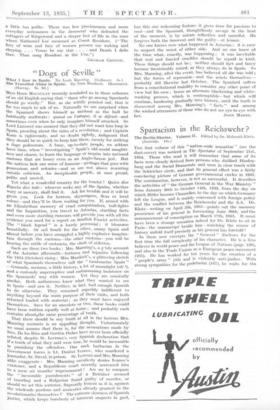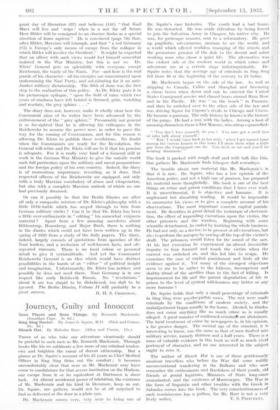THE 'first volume of this in " r n h a e tio s n p - e w ct i at de or se o n f sa se ti p o L " th ( e see r dust-cover) was noticed 21st, facts
were weTreho:leearwiyhodererit fro it wniill persons whothat someHe iondf ei4ts burg and the Social Democrats and were in close touch with the Schleicher circle, and that its general effect was a fairly convincing picture of German governmental circles in 1982. The continuation, however, is not so successful. It describes the activities of " the German General in the War Ministry " from January 30th to October 14th, 1938, from the day on which Hitler became Chancellor, to the day on which Germany left the League, and is mainly concerned with foreign policy and the conflict between the R,eichsweltr and the S.A.' Dr. Klotz—writing on April 5th, 1935—points out the uncanny prescience of his general in forecasting June 80th, and the announcement of conscription on March 17th, 1935. It must general has et have been a strange sensation indeed for Dr. Klotz to sit in tdri. discloses iesis for a r ! firm hc Paris—the manuscript beside him—watching the course of history unfold itself precisely as his' In these new excerpts the"hGisencheraarla'c' se first time the full complexity of believer in world peace and the League of Nations (page 128), and also in the Trade Unions as a European peace movement (205). He has worked for ten years for the creation of u " people's army " (44) and is violently anti-junker. With strong sympathies for the proletariat (167), he waits for the great day of liberation (87) and- believes (141) " that Karl Marx will live and ' reign' when in a not far off future Herr Hitler will be consigned to an obscure limbo as a special abortion of home sapiens." He is convinced (page 76) that, after Hitler, Marxism will triumph, and that " a red Germany (75) is Europe's only means of escape from the collapse in which Hitler will involve the Occident." It might be expected that an officer with such views would feel 'Muse] f somewhat isolated in the War Ministry, but this is not so. Dr. Klotz' General gets on splendidly with everyone except Reichenau, the toady of the Nazis. For--and here is the real puzzle of his character—all his energies are concentrated upon undermining the Nazi Party, and substituting for it an anti- Junker military dictatorship. The 30th of June was the first step to the realisation of this policy. As Dr. Klotz puts it in his picturesque epilogue, " upon the field of ruins which two years of madness have left behind is throned, grim, watching and resolute, the grey sphinx . . ."
The diary does not, however, make it wholly clear how the Communist aims of its writer have been advanced by. the enthronement of the " grey sphinx." Presumably our general is so far-sighted that he is allowing his colleagues in the Reichswehr to assume the power now, in order to pave the way for the coming of Communism, and for this reason is allowing Dr. Klotz to publish these revelations. No doubt when the Communists are ready for the Revolution, the General will retire and Dr. Klotz will see to it that his pension is adequate. For it is really very kind of a General still at wprk in the German War Ministry to give the outside world such full particulars upon the military and naval preparations and the foreign policy of his own country. Indeed, the diary is of ' momentous importance, revealing, as it does, that respected officers of the Reichswehr are equipped, not only with a truly Marxian vocabulary of abuse and vituperation, but also with a complete Marxian outlook of which no one had previously dreamed.
Or can it possibly be that the Berlin Diaries are after all only a composite mixture of Dr. Klotz's philosophy with a little tittle-tattle which has seeped through to him from German military circles ? Can it be that Dr. Klotz has been a little over-enthusiastic in " editing " his somewhat exiguous material ? Apart from a few amusing anecdotes about Ribbentrop, Rosenberg, and Major Buch, there is nothing in • the diaries which could not have been written up in the spring of 1935 from a study of the daily papers. The diary, indeed, largely consists of quotations from speeches of the Nazi leaders, and a recitation of well-known facts, and oft- repeated rumours. There is no local .colour or personal detail to give it verisimilitude. And yet the Communist Reichswehr General is an idea which would have distinct possibilities hi the hands of an " editor " of political insight and imagination. Unfortunately, Dr. Klotz has neither, and possibly he does not need them. Nazi Germany is in one respect like early Bolshevik Russia. No " revelations " about it are too stupid to be disbelieved, too dull to be ignored. The Berlin Diaries, Volume II will probably be a







































 Previous page
Previous page